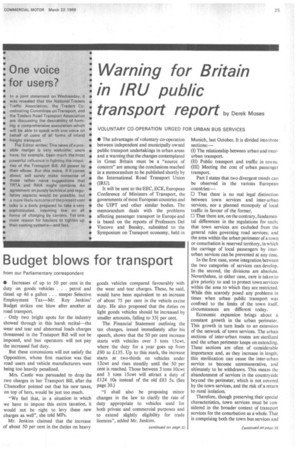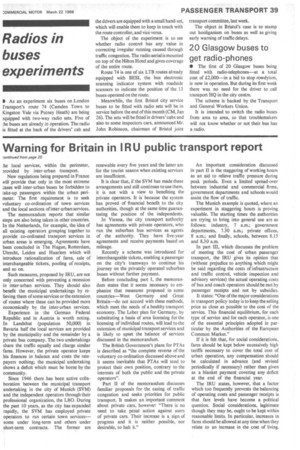Warning for Britain in 1RU public
Page 27

Page 41

If you've noticed an error in this article please click here to report it so we can fix it.
transport report by Derek Moses
VOLUNTARY CO-OPERATION URGED FOR URBAN BUS SERVICES • The advantages of voluntary co-operation between independent and municipally owned public transport undertakings in urban areas and a warning that the changes contemplated in Great Britain must be a "source of concern" are among the conclusions reached in a memorandum to be published shortly by the International Road Transport Union (IRU).
It will be sent to the EEC, ECE, European Conference of Ministers of Transport, the governments of most European countries and the UIPT and other similar bodies. The memorandum deals with the problems affecting passenger transport in Europe and is based on the reports of Professors Del Viscovo and Beesley, submitted to the Symposium on Transport economy, held in
Munich, last October. It is divided into three sections:—
(I) The relationship between urban and interurban transport.
(II) Public transport and traffic in towns.
(III) Meeting the cost of urban passenger transport.
Part I states that two divergent trends can be observed in the various European countries:
0 That there is no real legal distinction between town services and inter-urban services, nor a planned monopoly of local traffic in favour of the former.
0 That there are, on the contrary, fundamental differences in the regulations for each; that town services are excluded from the general rules governing road services; and the area within the urban perimeter of a town or conurbation is reserved territory, in which the carriage of local passengers by interurban services can be prevented at any time.
In the first case, some integration between the two categories of services can develop. In the second, the divisions are absolute. Nevertheless, in either case, care is taken to give priority to and to protect town services within the area to which they are restricted. While this scarcely posed any problems in times when urban public transport was confined to the limits of the town itself, circumstances are different today.
Economic expansion brings about a constant growth in the urban perimeter. This growth in turn leads to an extension of the network of town services. The urban sections of inter-urban routes are sterilized and the urban perimeter keeps on extending. These sections are often of considerable importance and, as they increase in length, this sterilization can cause the inter-urban service to become unremunerative, and ultimately to be withdrawn. This means the abandonment of services in the countryside beyond the perimeter, which is not covered by the town services, and the risk of a return to rural isolation.
Therefore, though preserving their special characteristics, town services must be considered in the broader context of transport services for the conurbation as a whole. That is comprising both the town bus services and he local services, within the perimeter, Provided by inter-urban transport.
New regulations being prepared in France will provide that only in the most extreme zases will inter-urban buses be forbidden to lake-up passengers within the urban perimeter. The first requirement is to seek voluntary co-ordination of town services and the local sections of inter-urban services.
The memorandum reports that similar steps are also being taken in other countries. In the Netherlands, for example, the idea of all existing operators grouping together to provide co-ordinated transport services in urban areas is emerging. Agreements have been concluded in The Hague, Rotterdam, Utrecht, Leiden and Haarlem which will introduce rationalization of fares, sale of interchangeable tickets, pooling of receipts, and so on.
Such measures, proposed by IRU, are not only concerned with preventing a recession in inter-urban services. They should also benefit the municipal undertakings by relieving them of some services or the extension of routes where these can be provided more economically by the inter-urban services.
Experience in the German Federal Republic and in Austria is worth noting. In Landshut (population 50,000) in Bavaria half the local services are provided by the municipality and the remainder by a private bus company. The two undertakings share the traffic equally and charge similar fares. However, the private operator keeps his finances in balance and costs the ratepayers nothing; the municipal undertaking shows a deficit which must be borne by the community.
Since 1946 there has been active collaboration between the municipal transport undertaking in the city of Munich (SVM) and the independent operators through their professional organization, the LBO. During the past 10 years, as the city has expanded rapidly, the SVM has employed private Operators to run certain town services— some under long-term and others under short-term contracts. The former are renewable every five years and the latter are for the tourist season when existing services are insufficient.
It is clear that, if the SVM has made these arrangements and still continues to use them, it is not with a view to benefiting the private operators. It is because the system has proved of financial benefit to the city authorities, though at the same time guaranteeing the position of the independents.
In Vienna, the city transport authority has agreements with private operators, who run the suburban bus services as agents of the authority. They have five-year agreements and receive payments based on mileage.
Recently a scheme was introduced for interchangeable tickets, enabling a passenger on the city's tramways to continue his journey on the privately operated suburban buses without further payment.
Before concluding part I, the memorandum states that it seems necessary to em phasize that measures proposed in some countries—West Germany and Great Britain—do not accord with these methods, which meet the needs of a healthy transport economy. The Leber plan for Germany, by substituting a basis of area licensing for the licensing of individual routes, will lead to the extension of municipal transport services and is likely to upset the balance of services discussed in the memorandum.
The British Government's plans for PTAs is described as "the complete reverse of the voluntary co-ordination discussed above and it seems inevitable that PTAs will tend to protect their own position, contrary to the interests of both the public and the private operators".
Part II of the memorandum discusses familiar proposals for the easing of traffic congestion and seeks priorities for public transport. It makes an important comment about private cars, however: "There is no need to take penal action against users of private cars. Their increase is a sign of progress and it is neither possible, nor desirable, to halt it." An important consideration discussed in part II is the staggering of working hours as an aid to relieve traffic pressure during peak periods. Even a limited spread-over between industrial and commercial firms, government departments and schools would assist the flow of traffic.
The Munich example is quoted, where an experiment in staggering hours is proving valuable. The starting times the authorities are trying to bring into general use are as follows: industry, 7 a.m.; government departments, 7.30 a.m.; private offices, 8 a.m.; and finally, schools, between 8.15 and 8.30 a.m.
In part III, which discusses the problem of meeting the cost of urban passenger transport, the IRU gives its opinion that (without prejudice to anything which might be said regarding the costs of infrastructure and traffic control, vehicle inspection and advisory services) the actual operating costs of bus and coach operators should be met by passenger receipts and not by subsidies.
It states: "One of the major considerations in transport policy today is to keep the selling price as close as possible to the cost of the service. This financial equilibrium, for each type of service and for each operator, is one of the essential principles adopted in particular by the Authorities of the European Common Market."
If it is felt that, for social considerations, fares should be kept below excessively high tariffs necessary to cover the total cost of urban operation, any compensation should be calculated in advance (and revised periodically if necessary) rather than given as a blanket payment covering any deficit at the end of the financial year.
The IRU states, however, that a factor which too frequently prevents the balancing of operating costs and passenger receipts is that fare levels have become a political question. Social considerations, legitimate though they may be, ought to be kept within reasonable limits. In particular, increases in fares should be allowed at any time when they relate to an increase in the cost of living.












































































































